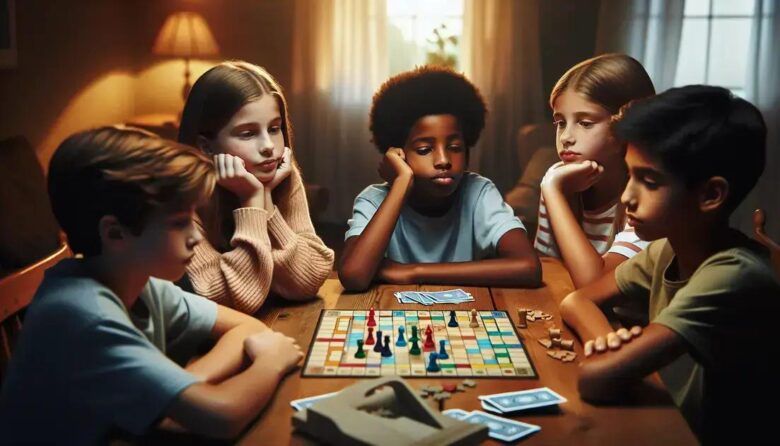Board games teaching patience for kids develop essential skills like waiting, turn-taking, and emotional control by engaging children in fun, structured play that promotes social interaction and focus.
Board games teaching patience for kids offer more than just fun—they introduce valuable life skills like waiting their turn and managing impulses. Ever noticed how a simple game can transform a fidgety child into a focused player? That’s the kind of magic we explore here.
why patience matters in childhood development
Patience is a key skill in childhood development that affects many areas of a child’s life. It helps kids manage frustration, improve focus, and build stronger relationships. When children learn patience early, they are better prepared to face challenges calmly and thoughtfully.
Emotional Benefits
Developing patience allows children to handle emotions like anger and disappointment without acting impulsively. This emotional control is essential for healthy social interactions and self-regulation.
Cognitive Advantages
Patience encourages children to concentrate longer on tasks, which enhances learning and problem-solving skills. It fosters persistence, helping kids stick to challenges until they find solutions.
Social Impact
Kids who practice patience are more likely to wait their turn and share with others, important parts of teamwork and cooperation. These social skills contribute to positive friendships and group interactions.
Teaching patience early supports overall growth, making it easier for children to succeed both academically and personally as they mature.
board games that encourage waiting and turn-taking
Board games that encourage waiting and turn-taking are excellent tools to teach kids patience in a fun way. These games require players to wait for their turn carefully and think about others’ moves, which helps them learn important social rules.
Popular Games That Teach Turn-Taking
Games like Uno, Candy Land, and Connect 4 are great examples. They are simple enough for young children yet provide clear rules where players must wait for their turn.
How These Games Help
By playing these games, children practice patience as they watch others play and plan their moves. It also fosters empathy, as they learn to respect their friends’ turns and emotions during the game.
Encouraging Positive Behavior
During gameplay, parents can praise kids when they wait calmly and explain why taking turns is important. This reinforces positive behavior and makes the learning experience memorable.
Using board games for teaching turn-taking creates a natural setting where kids develop patience without feeling pressured, making learning enjoyable and effective.
how games build social skills and emotional control
Playing board games offers children a chance to develop important social skills like communication, cooperation, and empathy. When kids engage in games, they learn how to interact respectfully with others and understand different perspectives.
Building Emotional Control
Games often involve winning and losing, which teaches children how to handle emotions like excitement and disappointment. Learning to stay calm and patient during these moments strengthens their emotional control.
Improving Communication
Many games require players to explain rules, negotiate turns, or discuss strategies. This encourages clear and respectful communication, important skills for teamwork and making friends.
Enhancing Cooperation
Cooperative games where players work toward a common goal promote teamwork. Children learn to support each other and share responsibilities, boosting their ability to collaborate effectively.
Overall, board games create a safe space for kids to practice social interactions and emotional regulation while having fun.
tips for parents to make game time a learning moment

Parents can turn game time into powerful learning moments by encouraging patience and positive behavior during play. Setting clear expectations before starting helps kids understand the importance of taking turns and following rules.
Model Patience and Respect
Children learn a lot by watching adults. Modeling patience and calmness during games teaches kids to mirror these behaviors when they play.
Use Praise to Reinforce Positive Actions
Praising children when they wait their turn or handle losing gracefully boosts their confidence and encourages them to continue practicing patience.
Discuss Emotions and Strategies
Talking about feelings during and after the game helps kids understand their emotions. Discussing strategies also promotes critical thinking and keeps them engaged.
Keep Sessions Short and Fun
Shorter game sessions match young children’s attention spans better and keep learning enjoyable rather than frustrating.
With these tips, parents can create a supportive environment where patience and turn-taking become natural and enjoyable skills for their children.
examples of simple games to start with
Simple board games are perfect for teaching patience and turn-taking because they are easy to understand and quick to play. These games help kids focus without feeling overwhelmed by complicated rules.
Uno
Uno is a colorful card game where players match numbers or colors. It requires waiting for your turn and planning ahead, which builds patience and decision-making skills.
Candy Land
Candy Land uses a simple race-to-the-finish mechanic. Players take turns drawing cards to move along the board, helping young children learn to wait their turn and follow game rules.
Connect 4
Connect 4 involves dropping discs into a grid to make four in a row. It’s easy to grasp and teaches strategic thinking and the importance of turn-taking.
Memory Matching Games
These games require players to find matching pairs by flipping cards. Kids must wait patiently for their turn and improve attention span and memory.
Starting with these simple games creates a fun and gentle introduction to the valuable skills of patience and cooperative play.
strategies to keep kids engaged during play
Keeping kids engaged during play is important for teaching patience and turn-taking effectively. One key strategy is to choose games that match their interests and skill levels, so they stay motivated and challenged without getting frustrated.
Use Positive Reinforcement
Praising children for their patience and fair play encourages them to continue these behaviors. A simple “great job waiting your turn” can boost their confidence and focus.
Break Games into Manageable Segments
Shortening game sessions or breaking play into smaller rounds helps maintain attention and energy. This prevents boredom and keeps the learning experience fun.
Incorporate Variety
Rotating different games or mixing cooperative and competitive play ensures children stay interested and engaged over time.
Create a Supportive Environment
Encouragement from parents or caregivers, along with clear expectations, helps kids feel safe and motivated to participate patiently.
By applying these strategies, game time can become an enjoyable moment where kids build crucial skills without losing interest.
measuring progress in patience through gameplay
Measuring progress in patience through gameplay involves observing how children handle waiting and turn-taking over time. Parents and caregivers can notice improvements by tracking specific behaviors during game sessions.
Look for Increased Wait Times
When kids can wait longer for their turn without getting upset, it shows growth in their patience. Gradual increases in wait tolerance indicate they are learning to manage impulses better.
Observe Emotional Responses
Watching how children react to winning, losing, or delays helps measure emotional control. Fewer tantrums and more calm responses suggest stronger emotional regulation.
Note Rule Following
Consistently following game rules without reminders highlights growing self-discipline and respect for turn-taking, both tied to patience.
Encourage Self-Reflection
As children play, asking gentle questions like “How did you feel waiting for your turn?” helps them recognize and articulate their progress.
Tracking these behaviors over multiple games provides clear insight into a child’s developing patience and social skills during play.
Building patience and turn-taking through board games
Board games are a fun and effective way to teach kids patience and how to take turns. These games help children develop social skills, emotional control, and focus while enjoying time with family and friends.
By choosing the right games and using simple strategies, parents can create meaningful learning moments that support their child’s growth. Watching progress over time can be encouraging and shows that patience is a skill that improves with practice.
Encouraging play with patience and respect creates a positive foundation for children’s success both in games and in life.




